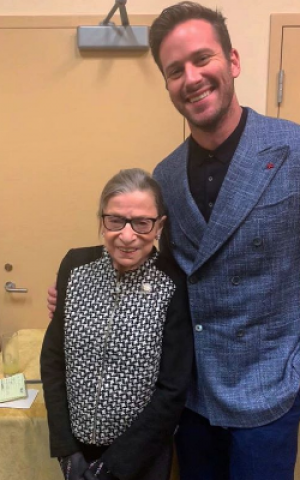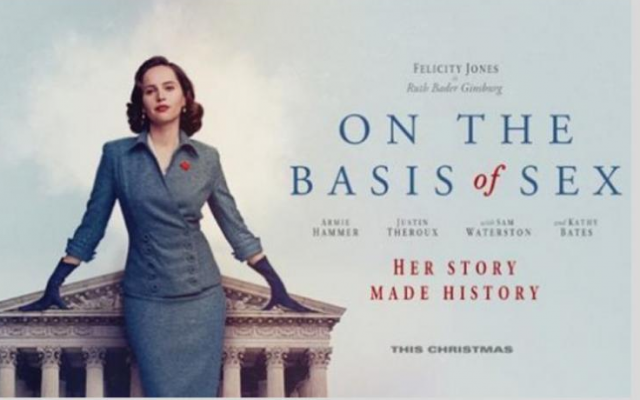New Justice Ginsburg Film Needs More Ginsburg
“On the Basis of Sex” is an often effective and dramatic American history lesson set amid the early professional life of Supreme Court Justice Ruth Bader Ginsburg.
“On the Basis of Sex” is an often effective and dramatic American history lesson set amid the early professional life of Supreme Court Justice Ruth Bader Ginsburg. It follows her from her first days as a Harvard Law School student in the mid ’50s to her successful fight in 1972 to help overturn America’s long history of discrimination against women.
The film, which opens here next week, stars British actress Felicity Jones as the young wife and mother who confronts, early on, the difficulty of being a woman in a legal profession long-dominated by men. Armie Hammer is her husband, Martin, also a brilliant lawyer, who becomes a fully supportive partner in his wife’s pioneering effort to update women’s legal status.
Together they formed part of the backbone of an effort, often led by Jewish women in the 1960s and 1970s, to gain for those of their gender in America the same advances in civil rights that were being extended to blacks and other racial minorities.
There were women like Betty Friedan, who published the best seller, “The Feminine Mystique,” in 1963; Gloria Steinem, who helped found Ms. magazine in 1971; and Bella Abzug, the fiery Congresswoman who, with Steinem, helped found the National Women’s Political Caucus around the same time.
Yet, as is often the case in Hollywood, “On the Basis of Sex” makes almost no reference to Ginsburg’s Jewish heritage or the prophetic tradition from which it sprang.
Despite a capable, professional performance by Jones, moviegoers are not likely to confuse her with the iconic justice. Even with Jones’ specially capped teeth and grey-blue contacts, she seems, in this film, just like another smart, successful lawyer striving to do good in an era of liberal change in America.
One wonders how the film would have turned out with Natalie Portman as the star. She hung on during the four-year development process of the film, but had to drop out because of scheduling difficulties.

It’s the same with the too handsome, too tall Hammer. In real life, he’s the great-grandson of Armand Hammer, the late billionaire Jewish oilman and financial wizard. Together, Jones and Hammer as upwardly mobile New York lawyers don’t seem to be a couple who could find Brooklyn, the heroine’s birthplace, with a map.
Still, the movie comes to the screen with the backing of several heavy hitters in the media world. It is a presentation of Focus Features, the production arm of Comcast; Amblin Entertainment, Steven Spielberg’s production company; Participant Media, which produced the recent hit documentary about Ginsburg; and the Chinese internet behemoth, alibaba.com. With that kind of financial backing, you can expect a concerted marketing push to position this film for the Academy Awards, which are scheduled for February 2019.
What sets the film apart is the story, a well-told tale of legal strategizing and maneuvering that pits the Ginsburgs and their supporters at the American Civil Liberties Union against John Mitchell’s Justice Department during the Nixon years.

Screenwriter Daniel Stiepleman, who is Justice Ginsburg’s nephew, has given Jones some snappy dialogue. One example is her banter with Mel Wulf, who headed the New York office of the ACLU and thought Ginsburg was taking on a losing cause.
Wulf: You will lose, Ruth, and when you do, you will set the women’s movement back 10 years.
Ginsburg: You don’t get to tell me when to quit.
Wulf: Get your emotions in check.
Ginsburg: You first.
There are several moments in the film that capture the Ginsburg magic, but her brief, wordless cameo at the end of the film is a telling reminder of what is missing from the film.
In the end, this effective slice of legal history could use more of Ginsburg’s unique blend of fire and ice. For that, you’ll need to see the wildly successful “RBG,” the documentary that was one of the most viewed nonfiction films of the past year.
Save “On the Basis of Sex, which opens here Dec. 25, as a reminder of how far and how fast women have progressed in the past 50 years. But don’t forget the documentary. As the pop music classic from the late 60s put it, “ain’t nothin’ like the real thing.”




comments